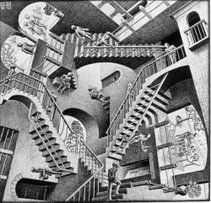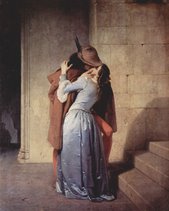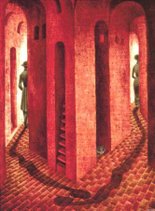- Esperanto: the most widely spoken constructed international language. The name derives from D-ro Esperanto (Dr. Hopeful), the pseudonym under which L. L. Zamenhof first published the language in 1887. Universala Esperanto-Asocio.
- Ido: a "reformed" version of Esperanto. It was developed in the early 1900s, and still has a small following today. Uniono por la Linguo Internaciona Ido.
- Interlingua: based on the Romance languages. It was first published in 1951 by the International Auxiliary Language Association, based on words common to French, Italian, Spanish/Portuguese, and English. It includes a simplistic grammar and loose pronunciation guidelines. Union Mundial pro Interlingua.
- Volapük: created in 1879-1880 by Johann Martin Schleyer, a Catholic priest in Baden. The vocabulary is mostly from English, with a smattering of German and French, and often modified it beyond easy recognizability. Here you can find a handbook of Volapük, and , a ten-lesson course.
- Europanto: created in 1996 by Diego Marani. There are no fixed rules, merely a set of suggestions. Europanto as it is used, tends to have a grammar much like English, with words borrowed from various languages and adapted to be easily understood. Europanto home page.
- Folkspraak: intended to be quickly learnable by all Germanic speakers. The original idea is that a word from the same root, with the same or similar meaning should be common in, or at least exist in three out of four languages (core languages) including (General) English, (High) German, Dutch and Swedish/Norwegian/Danish (often counted as one language, where a word wouldn't need to be common in more than one of the languages).
- Mondlango: also known as Ulango, is similar to Esperanto with a greater English influence. It was initially authored by He Yafu in 2002. Monlango home page.
- Lingua Franca Nova: created by C. George Boeree of Shippensburg University, Pennsylvania. It is based on French, Italian, Portuguese, Spanish, and Catalan. The grammar is based on that of Romance creoles. LFN home page.
- Latino sine Flexione: invented by Giuseppe Peano, a mathematician in 1903. The language itself is simplified version of Latin, and retains its vocabulary. Europeano home page.
Artlangs:
- Sindarin: developed by J. R. R. Tolkien. it was the Elvish language most commonly spoken in Middle-earth in the Third Age. It was the language of the Sindar, those Teleri which had been left behind on the Great Journey of the Elves. Tol Elenath School of Sindarin.
- Quenya: one of the languages spoken by the Elves in J. R. R. Tolkien's work. It was the language that developed among those non-Telerin Elves that reached Valinor from an earlier language called Common Eldarin. Here it is a Quenya course and here, more information.
- Klingon: created by Marc Okrand for Paramount Pictures and spoken by Klingons in the fictional Star Trek universe. He designed the language with Object Verb Subject (OVS) word order to give an alien feel to the language. Klingon is similar to Native American languages in several aspects. The Klingon Language Institute, Klingonska Akademien.
- Toki Pona: designed by Canadian translator and linguist Sonja Elen Kisa. It was first published online in mid-2001. Toki Pona is a minimal language. Like a pidgin, it focuses on simple concepts and elements that are relatively universal among cultures. The language has 14 phonemes and 118 words. Official site.
- Newspeak: a fictional language in George Orwell's famous novel Nineteen Eighty-Four. Newspeak is closely based on English but has a greatly reduced and simplified vocabulary and grammar. This suited the totalitarian regime of the Party, whose aim was to make subversive thought ("thoughtcrime") and speech impossible.
- Nadsat: a constructed set of Russian-based slang invented by the linguist, novelist, and composer Anthony Burgess. Nadsat is a teen language spoken by Alex and his 'droogs' in the futuristic world of A Clockwork Orange. It is basically English, with some transliterated words from Russian.
Engelangs:
- Loglan: developed beginning in 1955 by James Cooke Brown with the goal of making a language so powerfully expressive for logic and calculation that people learning it would think better if the Saphir-Whorfhypothesis were true. The Loglan Institute.
- Lojban: created by the Logical Language Group in 1987 based on the earlier Loglan, with the intent to make the language more complete, usable, and freely available. The grammar is based on predicate logic, and is capable of expressing complex logical constructs precisely. The Logical Language Group.
- Ro: an a priori 'philosophical language,' meaning you can guess what category of meaning a word falls into merely by looking at the first letters. For example, bofoc means red, bofod means orange, and bofof means yellow. It was created by the Reverend Edward Powell Foster (1853-1937).
- Ithkuil: designed by American linguist John Quijada to convey large amounts of linguistic information using fewer and shorter words than naturally-evolved languages; most sentences in other languages will be shorter when translated into Ithkuil. Grammar here.
- Láadan: created by Suzette Haden Elgin in 1982 to test the Sapir-Whorf Hypothesis for women, specifically to determine if Western natural languages were better suited for expressing the views of men than women.











2 comments:
Hi!
I actually didn't know where to contact you, so I'm sorry if this is the wrong place.
I found your entry in my guestbook on http://mitglied.lycos.de/juronjaure which I was very happy about. You actually have a nice page too and I find it interesting to read about the different topics. If it's ok I will put a link to your page on my page. Good job!
Greetings
Ronja
Hello!
My friends and I really want to learn Esperanto, and we want a course that will take you through fluency (or as close to it as possible) and isn't dry and boring. We've looked at lernu, and went through the basic courses, and started on that page where you drag and drop words to form sentences, but those lessons are so incredibly dry it's hard to retain information.
Can you recommend any books or other courses? How did you obtain fluency?
Thanks!
Mathieux
Post a Comment